Scottish independence: What would it mean for the rest of the UK?
- Published
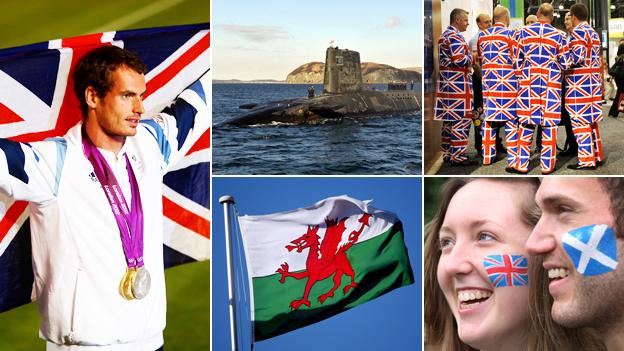
In September next year voters in Scotland will go to the polls to decide whether or not to become independent. Campaigners and commentators have made much of the implications for people north of the border - but how would an independent Scotland impact on the rest of the UK and Europe?
Would the Labour Party in the rest of the UK struggle?
There is a theory that the House of Commons would be dominated by the Conservative Party if Scottish MPs were excluded. "If the Scots vote Yes then the UK is heading for its most significant constitutional crisis since the Great Reform Bill clashes of 1830-32," wrote David Aaronovitch, external.
In 1955 the Conservatives were the biggest party in Scotland, but after that their support slumped.
"At two elections - 1964 and 1974 - Labour would not have won without Scottish votes. And at the last election, David Cameron would have gained an overall majority if Scotland's votes had been excluded," Aaronovitch wrote.
But Vernon Bogdanor, professor of government at King's College London, says it would be a mistake to over-egg the impact. The most likely change would be that "Labour would have to tailor its message more to voters in England", which might lead to more Blairite policies, he says.
John Curtice, professor of politics at Strathclyde University agrees that Scottish independence wouldn't equate to "one party rule" in the rest of the UK. But the double whammy of removing Scottish MPs and boundary changes expected after the 2015 election would help the Conservatives and make things harder for Labour, he says.
Would Wales move towards independence if Scotland leaves the UK?

"At the moment we find that in all surveys, no matter how exactly you ask the question, support for [Welsh] independence is around 10% and hasn't increased at all in the last decade and a half. It is a minority taste and not really a serious option," says Roger Scully, professor of political science at Cardiff University.
The Labour Party has dominated the political landscape in Wales since the 1920s, and has been the largest party in the National Assembly every year since its establishment. During a recent visit the Welsh First Minister Carwyn Jones said "a strong Scotland in a strong UK is a positive choice".
But Leanne Wood, leader of Plaid Cymru, the Welsh equivalent of the SNP, thinks the referendum could be a turning point. In July she said that should Scotland leave the union, Wales would eventually follow, external. Wood has even hired the same political psychologist used by SNP leader and First Minister Alex Salmond to help further her party's cause.
Scully doesn't think the scenario is unimaginable. "If Scotland becomes independent and is seen as a success, it would change the nature of the debate and independence could become a serious mainstream option."
Additional reporting by Math Wiliam
Would the EU have a new member and what about the Eurozone?

Legal tender?
There has already been discussion about how Scotland would be admitted to the EU. Bogdanor says it would have to reapply for EU membership - a wish that would almost certainly be granted. But the terms of accession would be stiff "to deter other regions like Catalonia [in Spain]".
It's been pointed out that new countries joining the EU are formally required to adopt the euro, external as soon as the relevant criteria have been met. Salmond thinks the country will be able to join the EU while sidestepping that requirement, though. He sees the creation of a "sterling-zone" in which Scotland would share the pound with the UK.
"It's almost certain that there'll be a currency agreement, and people will use the pound," says Stuart McDonald of the Yes Scotland campaign, the group championing the bid for independence. Scotland is the rest of the UK's second biggest export market "so it's in our mutual interests that we all carry on using the pound", he suggests.
Alistair Darling, who heads the Better Together campaign, has expressed doubts about that possibility, however, saying that the arrangement wouldn't make sense if the countries were pulling apart politically.
How would the national debt for the rest of the UK be affected?
"Most commentators speak about a population share of debt," says McDonald of the Yes Scotland campaign. The Scottish government estimates, external that total UK debt will be £1.5 trillion in 2016-17, the year independence would take effect in the event of a yes vote. With 8.4% of the UK population, if debt was split according to the per capita ratio, Scotland would take on £122 billion in the year of secession.
One alternative calculation puts the figure at just £56 billion, and Alex Salmond has even suggested, external that Scotland might walk away from the debt altogether if it is refused the option of entering a "sterling zone".
The Better Together campaign says that defaulting on the debt would be "completely irresponsible," and lead to a higher cost of borrowing for the rest of the country. "It would put up mortgage payments," says campaign director Blair McDougall.
Would Team GB be no more?

Scottish athletes contributed 14 medals - half of them gold - to Team GB's record Olympic haul. Few will forget Andy Murray's win or Chris Hoy's double cycling gold.
Could an independent Scotland dash UK Sport's aim to beat the record tally in Rio 2016, then?
The British Olympic Association refused to be drawn on the issue, saying simply that it will be addressed after the referendum has taken place.
Emmanuelle Moreau, of the International Olympic Committee, says one of the requisites for recognising a new nation at the games is that certain "technical conditions" are met - such as having the right federations and clubs. An independent Scotland might be expected to be able to meet these conditions as it already competes as an entity in its own right at the Commonwealth Games, and is set to host the competition in Glasgow next year.
Scottish Sport Minister Shona Robison is confident the nation could compete in Brazil should it vote to leave the union. "If Scotland votes for independence we will be an independent country by the time of Rio 2016," she says.
Would a passport be required to cross into Scotland?
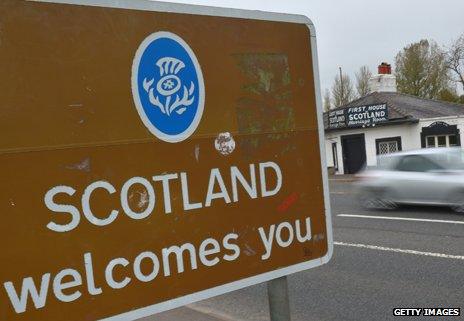
Freedom of movement is currently assured anywhere between Great Britain, Ireland, the Isle of Man and the Channel Islands - or the Common Travel Area as it is known.
Passports are occasionally required for air travel, but when crossing a border by land they're not needed. Better Together argue that there is no guarantee that will continue with an independent Scotland.
But imposing any restrictions would be a massive undertaking and contradict the current arrangement in Ireland where people are free to drive between Northern Ireland and the Republic without restrictions.
Neither the UK nor the Republic of Ireland are part of the Schengen Agreement - which allows passport-free travel between many other EU countries. Laurie Price, a travel expert with consultancy Mott Macdonald says that if an independent Scotland was forced to join Schengen when re-applying for EU membership, complications could arise.
Would people in the UK need to use an international dialling tone to ring Scotland?
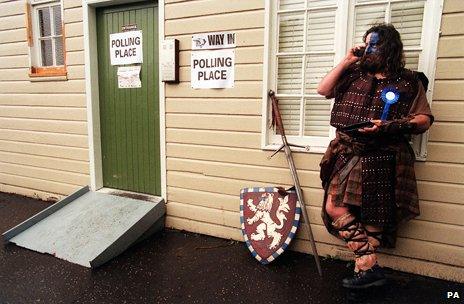
An independent Scotland would need to decide whether to keep using the +44 international dialling code currently used for the entire UK.
Neither campaign has given serious thought to the issue, and it is possible for separate countries to share a single code - the US and Canada both use +1.
When the Czech Republic and Slovakia split in 1993, each country acquired its own three digit code, as did newly formed South Sudan in 2011.
A spokesman for the International Telecommunication Union says that should Scotland refuse to share the +44 code, it would have to take a three digit alternative, with +422 being the most obvious spare extension.
Would the UK lose oil revenue?
The SNP are in little doubt about who should control the British North Sea oilfields. "It's Scotland's oil" was the party's famous slogan back in the 1970s, and it remains of vital importance today. A 2011 poll suggested that a majority of Scots would vote to quit the UK if they would be £500 a year better off, but would choose to stay if the figure was reversed.
Tax revenues of some £300bn have poured into the UK Treasury - from 40 billion barrels of oil over the last 40 years. Between 15 and 24 billion barrels are thought to remain, even before any potential new discoveries, so losing the oil fields would result in less money for the Exchequer.
By using a "median line" to mark out a swathe of ocean around the Scottish coast, some 90% of the oil falls in Scottish waters. Conversely, divvying up the reserves according to population share would leave Scotland with less than 10%. No negotiations have taken place, but most analysts suspect the former option is more realistic, and is in line with the most international agreements.
One think tank has suggested selling the oil fields back to the UK government in return for a lower share of national debt. "It may well be in Scotland's best interests to do an oil for debt swap," says Monique Ebell of the National Institute of Economic and Social Research - a move that would see the oil fields remain in the possession of the rest of the UK.
Where would the UK station its nuclear weapons?
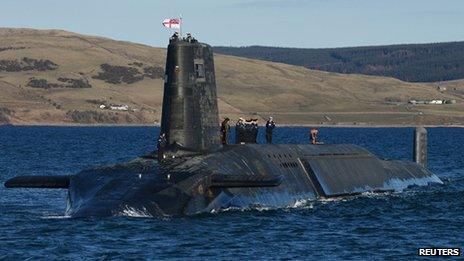
Nuclear submarine HMS Victorious returns to Faslane, Scotland
The UK has four Vanguard Class submarines carrying Trident nuclear warheads - and operating out of the Faslane naval base on the Clyde. But the SNP wants nuclear weapons removed from an independent Scotland at the earliest opportunity.
Some believe that could prove difficult to square with Nato obligations.
"Nato is an explicitly nuclear alliance with the US threatening to use nuclear weapons to uphold the security of every member - that's non-negotiable. The SNP hasn't thought through the implications of being a member," says Richard Reeve, of the Oxford Research Group think tank.
Salmond believes Scotland could become a member of Nato while still insisting on the removal of the warheads. In that event, where could they go?
Before Faslane was chosen in the 1960s, two other sites were considered - Milford Haven in Pembrokeshire and Devonport in Plymouth. Like Faslane, both have easy access to deep water, but neither is now regarded as suitable for a nuclear weapons site. One solution could be to keep the submarines at Devonport and construct a warhead storage facility near Falmouth, where the submarines could access them. "But this might be a controversial addition to an area with such a popular tourism industry," says Hugh Chalmers, research analyst at the Royal United Services Institute.
A spokesperson for the Ministry of Defence would only say that there are "no plans to move the nuclear deterrent", but that a vote in favour of independence would trigger a lengthy set of negotiations.
Would UK citizens get seamless medical care in Scotland?
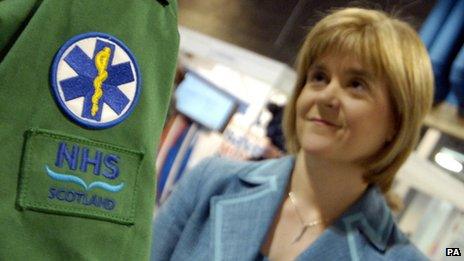
Proponents of independence are quick to point out that the Scottish NHS has effectively been an independent entity since its creation some 65 years ago.
Any resident of the UK is able to receive treatment in Scotland through a contractual arrangement it has with NHS England. They share specialist services too, so patients can benefit from expert doctors and facilities regardless of their geographic locations.
But the Better Together campaign predicts confusion in the case of independence. "If we leave the UK, we would be replacing a simple, internal relationship with an international, cross-border one," McDougall says.
Whatever arrangement is made, patients will receive a minimum level of cover, according to European rules that enable EU residents to receive treatment in most European nations. McDonald, of the Yes Scotland campaign, argues that disruption isn't in the interest of either side, and doesn't foresee major problems as a result. "The solution is already there," he says.
Would Northern Ireland's position be changed?

Sinn Fein's Gerry Adams and the DUP's Peter Robinson
Earlier this month the Economist wrote, external that "the greatest threat to Northern Ireland's place in the United Kingdom now comes from outside Ireland rather than within it".
Historically it shares strong cultural links with Scotland, but there has been no mention of a political bond between the two should the larger nation break away.
A spokesman for the DUP argues that Scottish secession would not change the desire to stay within what remained of the UK. "If Scotland were to leave we'd regret it, but that wouldn't ultimately change our place in the UK," he says, claiming that the union has never been more popular amongst Northern Irish voters.
There is a view that if Scotland left the UK it would weaken the union and make a united Ireland more attractive, however.
A spokesperson for Sinn Fein says the issue is one for the Scots to decide themselves, but calls for the British government to hold a border poll referendum "in the lifetime of the next assembly".
Follow @BBCNewsMagazine, external on Twitter and on Facebook, external